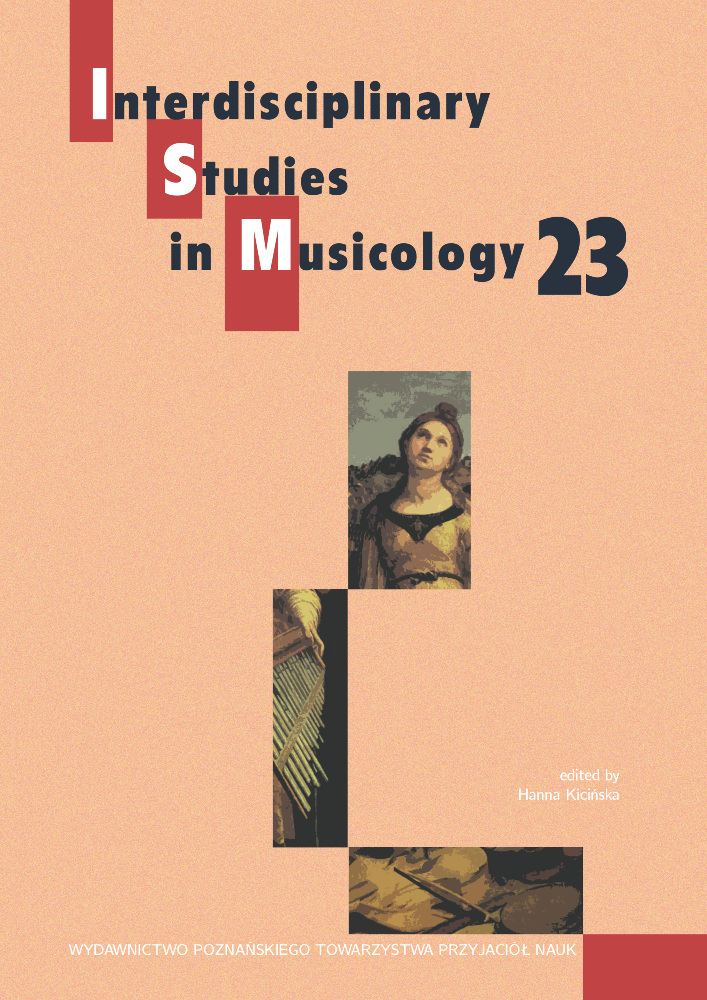Abstrakt
This study presents the concept of nationality in Polish music during the partition period as an interaction of three basic conceptual categories and evolution of their perception. The first one is a modern concept of nation, covering all social strata, being formed since the beginning of the 19th century and developed in the period between the November and January Uprisings. Historians apply the concepts of Johann Georg Herder and Stanisław Staszic unifying the role of a language.
The second category is Romanticism as an aesthetic and social challenge that underlines personality and subjectivity rather than ethnic or social origins; as a concept of deepest spirituality expressed in non-conceptual art of music.
All the elements making up the concept of nationality drew their strength from the third category – historicism which took control over the culture and art of the century. Almost mythical vision of an ideal, historic homeland dominated music, to the highest degree the operas on Polish themes, and, on unprecedented scale, adaptations of the canon of the greatest Polish literature (Słowacki, Mickiewicz, Kraszewski, Sienkiewicz, Wyspiański). In spite of the emergence of Positivism, the Romantic motifs in Polish poetry and belletristic such as the need for sacrifice to save Poland did not vanish. Similarly, in the fine arts, especially in the 2nd half of the 19th century, a remarkable growth in historic painting was observed. ‘Not only a sword but also a book promised salvation’, writes Alina Witkowska.
Bibliografia
Bogucka, M. (1991). Dzieje kultury polskiej do 1918 roku [History of Polish culture up to 1918]. Wrocław: Zakład Narodowy im. Ossolińskich.
Borkowska, G. (2008). Kto ma klucze do labiryntu polskiej kultury? Topos narodowy w literaturze postromantycznej [Who has the key to the labyrinth of Polish culture? The national topos in post-Romantic literature]. In W. Nowik (Ed.). Topos narodowy w muzyce polskiej okresu postromantyzmu i Młodej Polski [The national topos in Polish music of the post-Romantic and Young Poland period], (pp. 21–29). Warszawa: Wydawnictwo Akademii Muzycznej im. Fryderyka Chopina.
Chopin, F. (1955). Korespondencja Fryderyka Chopina [Correspondence of Fryderyk Chopin], (B. E. Sydow, Ed.). Warszawa: Państwowy Instytut Wydawniczy.
Chopin, F. (1962). Selected Correspondence of Fryderyk Chopin, (A. Hedley, Transl., Ed.). London: Heinemann.
Demska-Trębacz, M. (Ed.). (1991). Muzyka i naród: wybór tekstów [Music and the nation: a selection of texts]. Warszawa: Wydawnictwo Akademii Muzycznej im. Fryderyka Chopina.
Herder, J. G. (1784–1791). Ideen zur Philosophie der Geschichte der Menschheit, 4 parts. Riga – Leipzig: Hartknoch.
Herder, J. G. (1807). Stimmen der Völker in Liedern. Tübingen: Cotta.
Jabłoński, M., ‘Nowa muzykologia’? Kilka uwag ogólnych [‘New musicology?’ A few general remarks]. In M. Jabłoński & M. Gamrat (Eds.). Nowa muzykologia [New musicology], (pp. 7–26). Poznań: Wydawnictwo Poznańskiego Towarzystwa Przyjaciół Nauk.
Japola, J. (1998). Tekst czy głos? Waltera Onga antropologia literatury [Text or voice? Walter Ong’s anthropology of literature]. Lublin: Redakcja Wydawnictw Katolickiego Uniwersytetu Lubelskiego.
Kizwalter, T. (2006). Naród jako pojęcie organizujące życie zbiorowe. Polska 1795–1863 [The nation as a concept organising collective life: Poland 1795–1863]. In W. Nowik (Ed.). Topos narodowy w muzyce polskiej pierwszej połowy XIX wieku [The national topos in Polish music of the first half of the nineteenth century], (pp. 14–17). Warszawa: Wydawnictwo Akademii Muzycznej im. Fryderyka Chopina.
Kramer, L. (1992). The Musicology of the Future. repercussions, 1(1): 5–18.
Lang, P. H. (1941). Music in Western Civilisation. New York: W.W. Norton.
Mochnacki, M. (1830). [Review of Pisma rozmaite Kazimierza Brodzińskiego. Tom pierwszy. W Warszawie, w drukar. Józ. Węckiego] [Miscellaneous writings of Kazimierz Brodziński. Volume one. Printed in Warsaw by Józef Węcki]. Kurier Polski, 145: 741–746.
Ong, W. (1982). Orality and Literacy. The Technologizing of the Word. London: Routledge. DOI: https://doi.org/10.4324/9780203328064
Ordon (Szancer), W. (1872). Stanisław Moniuszko. Strzecha, 7–8: 327.
Pociej, B. (2002). Muzyczne style narodowe, ich splątane korzenie [National musical styles, their roots entwined]. In A. Matracka-Kościelny (Ed.). Wokół kategorii narodowości, wielokulturowości i uniwersalizmu w muzyce polskiej [Around the categories of the national, multi-cultural and universal in Polish music]. Warszawa – Podkowa Leśna: Stowarzyszenie Ogród Sztuk i Nauk.
Polony, L. (2016). Dzieło muzyczne a żywe doświadczenie muzyki [The musical work and the live experiencing of music]. In M. Jabłoński & M. Gamrat (Eds.). Nowa muzykologia [New musicology], (pp. 27–36). Poznań: Poznańskie Towarzystwo Przyjaciół Nauk. Wydawnictwo.
Stróżewski, W. (2002). Narodowe i uniwersalne – wychodząc od Norwida [National and universal – beginning with Norwid]. In A. Matracka-Kościelny (Ed.), A. Matracka-Kościelny (Ed.). Wokół kategorii narodowości, wielokulturowości i uniwersalizmu w muzyce polskiej [Around the categories of the national, multi-cultural and universal in Polish music], (pp. 17–24). Warszawa – Podkowa Leśna: Stowarzyszenie Ogród Sztuk i Nauk.
Świerzewski, S. (Ed.). (1961). J. I. Kraszewski i polskie życie muzyczne XIX wieku [J. I. Kraszewski and Polish musical life of the nineteenth century]. Kraków: Polskie Wydawnictwo Muzyczne.
Tarnowski, S. (1892). Chopin i Grottger. Dwa szkice [Chopin and Grottger: two sketches]. Kraków: Księgarnia Spółki Wydawniczej Polskiej.
Topolska, A. (2019). O tym jak Moniuszko patrzył w stronę niemieckich romantyków [On how Moniuszko looked towards the German Romantics]. Beethoven Magazine, 26: 20–22.
Walicki, A. (1977). Słowo wstępne [Foreword]. In J. Goćkowski & A. Walicki (Eds.). Idee i koncepcje narodu w polskiej myśli politycznej czasów porozbiorowych [The ideas and concepts of the nation in Polish political thought of post-partition times]. Warszawa: Państwowe Wydawnictwo Naukowe.
Witkowska, A. (1987). Wielkie stulecie Polaków [The great century of the Poles]. Warszawa: Państwowy Instytut Wydawniczy.
Wypych-Gawrońska, A. (2005). Literatura w operze. Adaptacje dramatyczno-muzyczne utworów literackich w Polsce do 1918 roku [Literature in opera: dramatic-musical adaptations of literary works in Poland up to 1918]. Częstochowa: Wydawnictwo im. Stanisława Podobińskiego.
Zieliński, A. (1969). Naród i narodowość w polskiej literaturze i publicystyce lat 1815–1831 [The nation and nationhood in Polish literature and journalism 1815–1831]. Wrocław: Zakład Narodowy im. Ossolińskich.
Licencja
Prawa autorskie (c) 2023 Irena Poniatowska

Utwór dostępny jest na licencji Creative Commons Uznanie autorstwa – Bez utworów zależnych 4.0 Międzynarodowe.
